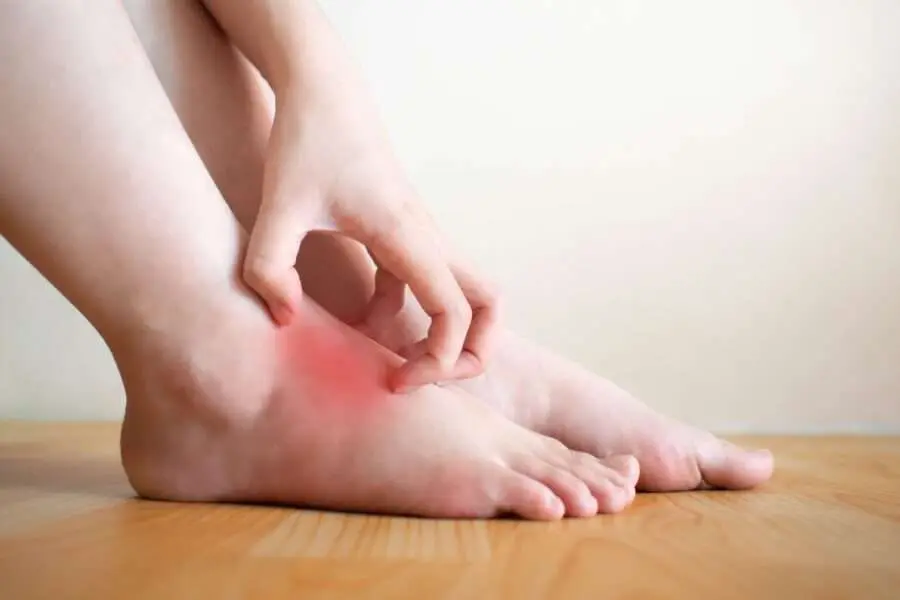
Also called dermatitis, eczema is an irritation of the skin causing itching and rashes. Although not contagious, this skin disease can be particularly resistant.
Eczema occurs in waves, where symptoms of irritation become more pronounced.
The rashes can then turn into blisters and ooze.
When eczema appears under the feet, the resulting lesions require special attention.
The soles of the feet are particularly vulnerable and are prone to fungal infections like athlete’s foot. Foot eczema lesions also provide an opportunity for plantar warts to develop.
Although eczema is sometimes difficult to contain, there is nothing to stop you from taking action to prevent it.
Here are 5 tips to prevent and relieve the effects of a recurrence of foot eczema.
1. Hydrate your feet
After a bath or shower, it is recommended to apply a cream or ointment to your plantar arch.
However, you should choose a moisturizer with a thick consistency and that does not contain any perfume.
Even if the skin on your feet doesn’t seem irritated, it’s important to keep it hydrated. This preventive measure will help reduce the incidence of other eczema flare-ups.
2. Avoid allergens
Allergies are one of the main triggers of eczema attacks, so it is best to run tests to determine which of these may be involved.
In the meantime, you will want to monitor your diet.
Common foods that contain allergens include:
- Nuts and peanuts
- Dairy products
- Egg whites
- Seafood or fish
- Grains like soybeans or wheat
- Chocolate
Some synthetic materials can also cause allergic reactions and itching. It is therefore preferable to wear cotton socks.
In addition to food allergens, it is worth avoiding other forms of irritants:
- Dust
- Turf grass
- Pollen
- Animal particles such as hair or saliva
- Fungi and moulds
3. Reduce your exposure to stress
Although stress is not a direct cause of eczema, it can contribute to aggravating the symptoms.
There are many options that can be explored, but ultimately, you should be comfortable with your methods of dealing with stress.
The following techniques may be used to help you manage your stress:
- Regularly practice a low- to high-intensity sport such as jogging.
- Reduce your exposure to cell phones.
- Stretch for 5 to 10 minutes once a day.
- Establish a relaxation exercise routine.
- Practise deep breathing.
4. Wash your feet daily
The soles of your feet are put to the test day after day. It is therefore normal for eczema to develop relatively easily.
While contact dermatitis is sometimes caused by poorly fitting shoes, it can also be exacerbated by poor foot hygiene.
It is not necessary to limit the frequency with which you wash your feet, but there are nevertheless some good practices to adopt:
- Avoid using water that is too hot.
- Use a mild, fragrance-free soap.
- Limit the amount of time your feet are immersed in water.
- Pat dry the skin thoroughly without rubbing it before applying moisturizers.
5. Consult a professional
Untreated, very stubborn foot eczema can become painful and cause lesions that can become infected. This is why it is occasionally necessary to have the podiatrist intervene.
In addition to determining the probable cause of your foot eczema, your podiatrist can recommend a treatment that is appropriate for each patient.
For plantar eczema, the podiatrist may recommend the following:
- Prescription drugs for topical application
- Corticosteroids (cortisone)
- Foot care (emollient pre-treatment or foot bath)
If your foot eczema causes other problems such as athlete’s foot, the podiatrist may also suggest an antifungal treatment.
A dermatological foot problem like eczema should not interfere with your daily life.
Do not wait for the next outbreak of this unpleasant irritation, contact a PiedRéseau clinic today.